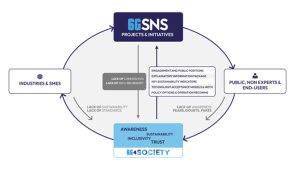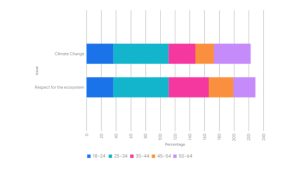The 6G4Society project aims to integrate social, environmental and economic values into the development of 6G technology, ensuring that advances in connectivity are consistent with ethical standards and principles of sustainability.
The debate around sustainability, digital rights and responsible innovation shows that being technically viable is no longer enough. What matters is not just whether a technology is adopted, but also its acceptability and reliability, its alignment with ethical expectations, its contribution to sustainability, and its reflection of shared societal values. As 6G technology continues to develop, these questions will become central to its legitimacy. The 6G4Society project explores how 6G can integrate social, environmental and economic aspects into the innovation itself.
Europe’s 6G vision combines technology with sustainability, policy and ethics. The Smart Networks and Services Joint Venture (SNS JU) provides a framework for research and innovation and supports projects such as 6G4Society, which explores how 6G technology can be harmonized with European values of inclusivity, reliability and sustainability.

This broad policy perspective reflects a growing European consensus that 6G must not only be faster and more efficient, but also promote environmental, social and economic sustainability. ¹ The 6G4Society project, along with other SNS initiatives, is driving this change by developing sustainability-oriented business models and measurable metrics that link technological advances to real-world benefits and sustainability. These models include concepts such as sustainability as a platform, circular resource marketplaces, and impact-focused partnerships, all designed to move from volume-based metrics to value-based outcomes.
Sustainability is at the heart of European connectivity
6G4Society was founded to ensure that social and environmental values are the basis of technological progress, not an afterthought. Through collaboration between social scientists, technologists, citizens and policy makers, this project aims to develop practical tools and frameworks that will make social inclusion and sustainability measurable, actionable and essential to Europe’s digital future.
Europe needs to rely on more comprehensive instruments such as frameworks, public engagement, value-based indicators, synergies between projects and policy integration. Below we develop each of these levers.
Not just specifications but also frameworks
The 6G Technology Acceptance Model Framework², developed by 6G4Society, introduces a structured method for assessing how new technologies resonate with ethical norms, cultural context, and social trust. Rather than focusing solely on KPIs such as throughput and energy efficiency, the framework incorporates qualitative and quantitative aspects such as citizen attitudes, inclusivity, and perceptions of equity.
Incorporating such frameworks into research projects allows social impact to be assessed alongside technical outcomes. This reflects a broader shift within SNS JU, from designing networks for performance to designing networks for people.
Early public engagement
6G4Society puts public engagement at the heart of its mission through activities such as citizen surveys that collect opinions from across Europe about their expectations, fears and hopes for next-generation networks.
The project considers participatory mechanisms such as workshops, focus groups, and living lab pilots. They are an integral part of policy-making and innovation governance. 3 Involving citizens early allows developers and policymakers to identify emerging concerns before they develop into resistance.

The citizen survey, which was conducted in nine languages and received more than 1,800 responses, was a combination of quantitative and qualitative questions designed to avoid bias and encourage reflection on lived experiences.
The survey results highlight a range of public attitudes, from curiosity and optimism to skepticism and fatigue. Many respondents recognized the potential of 6G to improve their daily lives through improved access to information and connectivity with loved ones. However, these expectations were accompanied by concerns that the rapid pace of technological change could outpace society’s needs.
Across age groups, environmental responsibility has emerged as a common priority. Younger participants were particularly aware of both social and environmental impacts, often linking connectivity to issues such as energy use and material consumption. Respect for ecosystems and biodiversity ranks as a top priority for generations, followed by climate change. Participants also linked digital equity to broader ideas of solidarity and social cohesion, emphasizing fair and inclusive access to connectivity.
These insights confirm that the public expects 6G technology to be designed with purpose, transparency, and responsibility. The results provide an important reference point for the social acceptance model that 6G4Society is developing, ensuring that the next generation of connectivity is guided by public values and designed for the well-being of humanity and the planet.
Key value and sustainability indicators
A sustainable 6G ecosystem requires new metrics. Traditional KPIs indicate how a network is performing, but not whether it improves sustainability or fairness. ⁴ To bridge this gap, 6G4Society is promoting the concepts of Key Value Indicators (KVI) and Key Sustainability Indicators (KSI).
These indicators measure aspects such as energy use and emissions, circularity of materials, resilience, equity, inclusion, and trust.
Developing the KVI and KSI will also enable comparisons across projects and policy areas, helping the EU assess whether public investments are truly meeting the Green Deal and Digital Decade goals. Within the SNS JU ecosystem, 6G4Society collaborates with other initiatives to harmonize definitions and methodologies to ensure that sustainability metrics are interoperable and reliable.
Synergies between projects
6G4Society works to create synergies across Europe’s diverse research and innovation landscape. Collaboration with other SNS JU projects ensures that social inclusion and sustainability become mainstream rather than isolated topics. ⁴
This cooperation extends beyond the SNS JU community. ³ 6G4Society collaborates with European and international efforts on standardization, regulation and digital inclusion to align goals and share lessons learned. Through workshops and joint publications, we contribute to building a common language among engineers, policy makers, and social scientists.
Policy integration
To have a lasting impact, insights from research need to be translated into policy and regulation. 6G4Society contributes by mapping how social values intersect with existing and emerging legal frameworks. By analyzing these intersections, the project identifies where policy instruments can enhance sustainability and inclusion.
The goal is clear. It’s about ensuring that incentives and regulatory mechanisms reward positive impact. Policy integration means aligning research findings with the European Green Deal, the Digital Decade goals and the ethical principles embedded in EU law. It also means ensuring that sustainability and equity are non-negotiable conditions for funding, implementation and standardization.
6G4Society transforms academic insights into practical guidance through position papers, workshops, and direct dialogue with policymakers. ⁸
Conclusion: Towards a value-driven 6G future
6G4Society’s work shows how Europe can move from ambition to implementation of embedding social and environmental values into technological systems. Built on sustainability and equity, 6G networks are more than just a technological achievement. It is democratic and cultural. This suggests that Europe’s technology future will be measured by the depth of trust, inclusiveness and shared benefits it brings.
References
Calisti, M., Aseeva, A., and Onwude, D. (2025). 6G Sustainability: Future Business Models. ACM. https://doi.org/10.1145/3748699.3749820 6G4Society Project: D1.1- Social aspects in 6G technology: concerns, acceptance models and sustainability indicators D2.1 Public engagement strategy and planning Rezaki, A., Trichias, K., Mesodiakaki, A., Gavras, A., Aseeva, A., Berardinelli, G., Osman, H., Gutiérrez Terán, J., Petersen, K., Gramaglia, M., Katz, M., Bezzi, M., and Ghoraishi, M. (Eds.). (2025). Sustainability of the SNS JU project – targets, methodologies, trade-offs, and implementation considerations for 6G systems. Petersen, K., Bezzi, M., Gavras, A., Calisti, M., Mohnani, P. (2025). The 6G value approach: The role of key value indicators in design and social impact. 6G4Society Project: D3.1 – Report on Liaison Activities 6G4Society Project: D1.2 – Towards a Socially Acceptable and Sustainable 6G Policy Outline 6G4Society Project: D4.1 – Dissemination and Communication Strategies and Plans
This article will also be published in the quarterly magazine issue 24.
Source link

